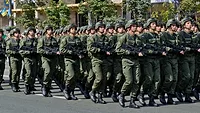State of the Ukraine conflict: Russia amps up propaganda
Check out Episode 11 of The Cybersecurity and Geopolitical Podcast

Security magazine brings enterprise security and risk professionals this entertaining and illuminating video podcast on the latest challenges and intriguing flashpoints within cybersecurity and the geopolitical landscape.
In this episode, Cyjax Chief Information Security Officer (CISO) Ian Thornton-Trump, CD, is joined by Grey Hare Media’s Philip Ingram, MBE, to discuss the current state of the Ukraine conflict. The security leaders cover the latest developments in Russia’s land forces, the failures of the country’s Navy, the ineffectiveness of the Russian Airforce and the seeming lack of fruition when it comes to security speculations of wide-scale cyber warfare.
You can listen to the audio version right here below! You can also listen on the go anytime via our Spotify and Apple podcast channels: The Security Podcasts.
Watch the video version here or listen to the audio podcast above or via this link.
As Ingram and Thornton-Trump relate, the state of Russian land forces is dire. After significant casualties largely and disproportionally inflicted on the best trained and best equipped Russian units, the “next line” of Russian forces is largely made up of conscripts. The poor training of these forces is evident from graphic combat footage.
As the May 9th “Victory Day” Russian propaganda parade exercise unfolds, the Kremlin may choose to do something dramatic to capture the world’s attention, potentially declaring victory over the Ukrainian forces defending the Steel Mill complex in the city of Mariupol. Ingram explores the importance of May 9th for the Russians and assesses potential Russian activities.
As anyone following the recent developments of the war knows, the sinking of the Moskva, a guided missile cruiser and flagship of the Black Sea Fleet, was a very significant victory for Ukraine. Thornton-Trump and Ingram suggest that this event demonstrates, along with the sinking of other Russian warships, a potentially deep problem with Russian naval forces, including poor training standards and a lack of situational awareness. These examples may provide some insight into the current state of Russian submarine capabilities, which are under close observation by NATO and EU forces.
Although the Russian Airforce has been flying some 200 missions a day, it appears the Russians have enjoyed limited success other than hitting large targets such as civilian infrastructure with unguided munitions. Russia lacks any air dominance in the region, and Ukrainian air defense capabilities, armed with Western technology, are proving formidable. There also appears to be little coordination between the Russian Battalion Tactical Groups and the Airforce to engage in close air support missions to back up tactical objectives on the ground.
It seems that Western cyber technology firms have prevented and thwarted numerous Russian cyberattacks on Ukraine, leaving one to wonder if the West has vastly over-estimated both the Russian military and cyber capabilities. With recent Russian air and missile attacks on the Ukrainian power plants, Russia is resorting to the traditional method of attacking national critical infrastructure, and the “Russian Global Cyber War” may be more hype than actual threat.
With the May 9 festivities in Russia, Thornton-Trump and Ingram speculate whether efforts to remove Putin will be enacted. The amount of power held by the Russian leader will make it difficult for any one individual to remove him from power, according to the speakers, but there have been historic power shifts during military parades, such as the assassination of Egyptian President Anwar Sadat in 1981. Thornton-Trump and Ingram cover what Putin's weapons against insubordination may include, as well as the likelihood of his removal from office.
Finally, Ingram and Thornton-Trump discuss the long-term consequences of the war in Ukraine and the very real possibility of Russia weaponizing agriculture exports and energy exports to advance its foreign policy aims and destabilize the governments of other countries if they are dependent on low food prices.
Looking for a reprint of this article?
From high-res PDFs to custom plaques, order your copy today!






